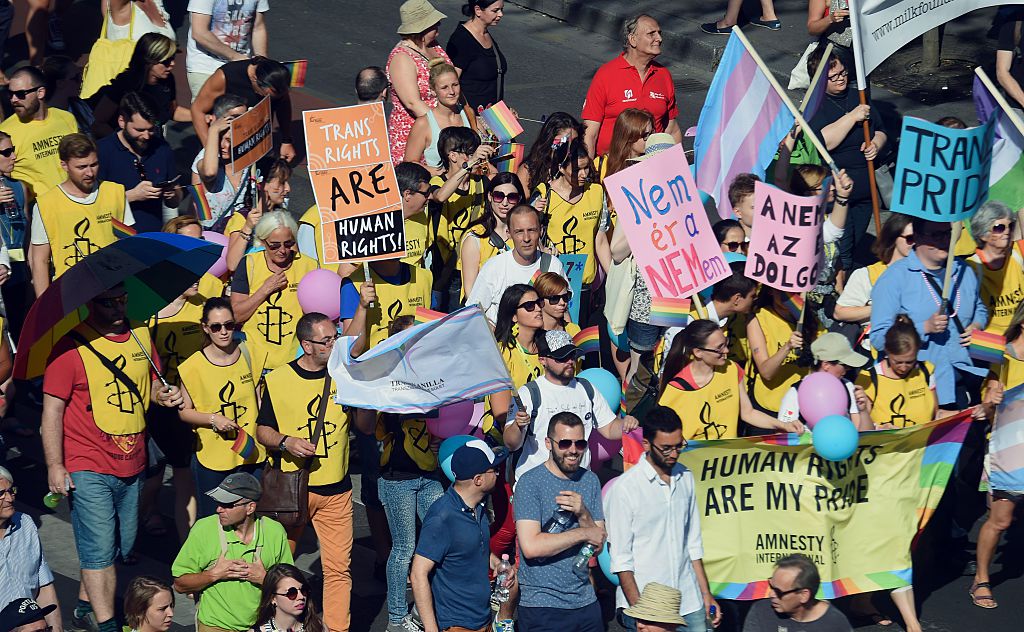
Hungary’s parliament has voted to end the legal recognition of transgender and intersex people—a move many human rights activists say marks “a really devastating day for trans rights” in the country.
The country’s parliament voted Tuesday in favor of legislation that would define gender as “biological sex based on primary sex characteristics and chromosomes,” making it impossible for people to legally change their gender from the one they were assigned at birth.
“Legal gender recognition is the bedrock of access to equality for trans and intersex people,” Katrin Hugendubel, Advocacy Director of the International Lesbian, Gay, Bisexual, Trans and Intersex Association (ILGA-Europe) tells TIME, adding that the new legislation risks impacting their daily lives and access to healthcare and employment opportunities.
News of the Hungarian government’s plans gained international attention in recent weeks, with a social media campaign launching to urge lawmakers to #drop33, named after the specific article in the proposed legislation relating to gender recognition. One independent Hungarian MP reportedly described the legislation as “evil” and “a step back in time” in advance of the vote.
Currently, Hungarians are allowed to legally change their gender on identity documents, although activists say that the process has stalled for many individuals in the last two years. Hungary’s right-wing Prime Minister Viktor Orbán, who was elected in 2010, has presided over several attacks on the LGBT+ community in the country. In 2017, he hosted a convention for the International Organization of the Family, a U.S. Christian group the Southern Poverty Law Center has designated a “hate group” for its anti-LGBT views. Earlier this month, Orbán’s government rejected the ratification of the Istanbul Convention to end violence against women, citing its “destructive gender ideologies,” as well as rejecting references in the treaty’s text to “gender” and to obligations to receive refugees persecuted over sexual orientation or gender.
“In day to day life, [the new legislation] has many implications,” says Hugendubel. “When an individual has an identity document that does not match their gender expression, that person is subjected to stigma, discrimination and harassment, and very often over-policing and violence in all areas of life. It basically means that every time you have to show your ID anywhere, you’re being forcefully outed as being trans or intersex.”
In a survey released on May 14 by the European Union’s Agency for Fundamental Rights, 64% of transgender respondents in Hungary said they had faced discrimination in the past year, with 84% also reporting that the main reason for increasing prejudice, intolerance, or violence in the country was “negative stance and discourse by politicians and/or political parties.” Additionally, 73% of the overall LGBTI community surveyed said the Hungarian government was “definitely” not effectively combatting such prejudice and intolerance against LGBTI people, compared with an average of 38% across the European Union and United Kingdom. Hugendubel says that over the last two years, trans-centred events, including film festivals and local pride parades, have been subject to attacks from opposition groups without adequate police protection or support from the government.
Recently, Orbán has been criticized for introducing powers to rule by decree during the coronavirus pandemic, with no clear time limit for ending the current state of emergency. In addition to the move to end legal gender recognition, other proposed legislation introduces jail terms for misinformation that hinders the government response to the pandemic. Activists and journalists say these new rules could lead to censorship or stifle criticism of the government’s response, since “misinformation” is at the discretion of the government.
Hungary isn’t the only country where minorities have been targeted during the pandemic: some religious figures in countries including Poland, Israel and the U.S. have blamed LGBT+ communities for the outbreak and its impact on the population. In Hungary, the new law will now go to the president for his signature, although local activists and campaigners are prepared to lobby the country’s Constitutional Court to review the law. “Adopting a legislation that is clearly violating human rights, the right to privacy and the right to families for trans and intersex people is further fueling stigmatization of that group, and is pulling them into the spotlight of very hateful campaigns,” says Hugendubel.
More Must-Reads from TIME
- Donald Trump Is TIME's 2024 Person of the Year
- Why We Chose Trump as Person of the Year
- Is Intermittent Fasting Good or Bad for You?
- The 100 Must-Read Books of 2024
- The 20 Best Christmas TV Episodes
- Column: If Optimism Feels Ridiculous Now, Try Hope
- The Future of Climate Action Is Trade Policy
- Merle Bombardieri Is Helping People Make the Baby Decision
Contact us at letters@time.com